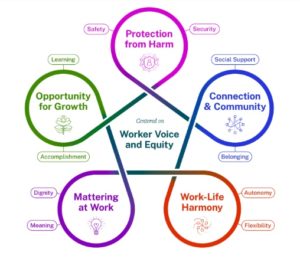Isolation & Remote Work: Your Mental Health Matters
Here we are again at the first part of May, Mental Health Awareness Month. At Haymaker, we utilize this time to reflect on our own mental health, and how we are dealing with the effects remote work has on it. We wanted to specifically address isolation this year, as it’s been a struggle for so many of us who have been working remotely much of our career, or even just within the last few years. We are also so happy to see that just this week, United States Surgeon General Dr. Vivek Murthy released a new Surgeon General Advisory calling attention to the public health crisis of loneliness, isolation, and lack of connection in our country.
As loneliness takes a national stage, we also turned to another recent report from friends at Buffer, who have completed a State of Remote Work report since 2018. In their 2023 report, one in three remote workers reports their biggest struggle is that they stay home too often because they don’t have a reason to leave. The next most selected struggle for remote workers was loneliness, with 23 percent. These two struggles go hand-in-hand and paint a picture of how the reality of remote work can be very challenging.
Effects of isolation can be both physical and mental
The impact of isolation on remote workers can be significant and far-reaching. It can lead to increased stress levels, decreased motivation, and reduced job satisfaction. This can, in turn, result in decreased productivity and a decline in overall mental health.
Isolation can be exacerbated by a lack of face-to-face interaction with colleagues, limited opportunities for socializing and networking, and a lack of physical separation between work and personal life.
In the U.S. Surgeon General report, it is outlaid that “the physical health consequences of poor or insufficient connection include a 29% increased risk of heart disease, a 32% increased risk of stroke, and a 50% increased risk of developing dementia for older adults. Additionally, lacking social connection increases risk of premature death by more than 60%.”
In addition to our physical health, loneliness and isolation contribute substantially to mental health challenges. In adults, the risk of developing depression among people who report feeling lonely often is more than double that of people who rarely or never feel lonely.

Isolation is a feeling of disconnection and loneliness that can arise when people are physically separated from others for an extended period of time.
Addressing isolation and keeping your own mental health in check
So, how, as a remote worker, can you ensure you keep your mental health top of mind, and address feelings of loneliness or isolation? Firstly, remote workers should prioritize maintaining social connections. This can be done through regular virtual meetings with colleagues, meeting in-person with your colleagues, and maintaining personal relationships with friends and family.
Fostering positive social interactions and relationships in the workplace supports worker well-being. This essential rests on two human needs: social support and belonging.
Connection is one the reasons we founded Haymaker – we wanted to ensure we were providing a place for remote workers to convene and connect with their co-workers in a comfortable environment. We see teams utilizing our spaces for locally residing team members to connect in person on a regular basis, or to bring people together from other locations for an offsite meeting. For many companies who have ditched the formal office location, Haymaker provides that space to convene and get work done together.
If you are unable to meet in person with your team, connect virtually with your team members outside of a meeting. Have an informal virtual coffee chat with cameras on, so you can get a better connection with your teammate. The aforementioned Buffer Report also offers some advice: ”It might be surprising to learn that most remote workers prefer to be on camera… A reason for favoring on-camera meetings included, “I don’t feel so isolated,” at 16 percent.”
Another way to combat isolation is to create a designated workspace that is separate from personal spaces. This physical separation can help you feel more focused and less isolated. If you don’t have space in your own home to get a separate work space, search for a Haymaker space that is nearby.
It’s also important to ensure you are getting some variety in your schedule. Remember, remote work offers options to your daily routine that a traditional office setting doesn’t. Taking advantage of those opportunities can make a big difference to your mental health and help you fight feelings of isolation. Step out of your usual work space to change mindset or point of reference. If a meeting could be taken without video, try taking it while on a walk. Change your setting to a library, a coffee shop, or try one of our Haymaker spaces for an afternoon.
In conclusion, the impact of isolation on remote workers can be significant, but there are steps that can be taken to mitigate its effects. By prioritizing social connections, creating a designated workspace, and prioritizing mental health, remote workers can combat the negative effects of isolation and thrive in their remote work environments. At Haymaker, we are here to help you do just that.
Additional Resources
There are some additional resources we found helpful in the Surgeon General’s Framework for Workplace Mental Health and Well-Being. It outlines five areas that are key to creating a healthy workplace. While Connection & Community and Work-life Harmony are key pillars of why we created Haymaker, we found all resources within helpful in creating a workplace with worker wellbeing in mind.

Looking for meeting space, office space, flexible on-demand work space, or a place for your next work or offsite event? Search for the perfect space for you at haymakerspace.com
